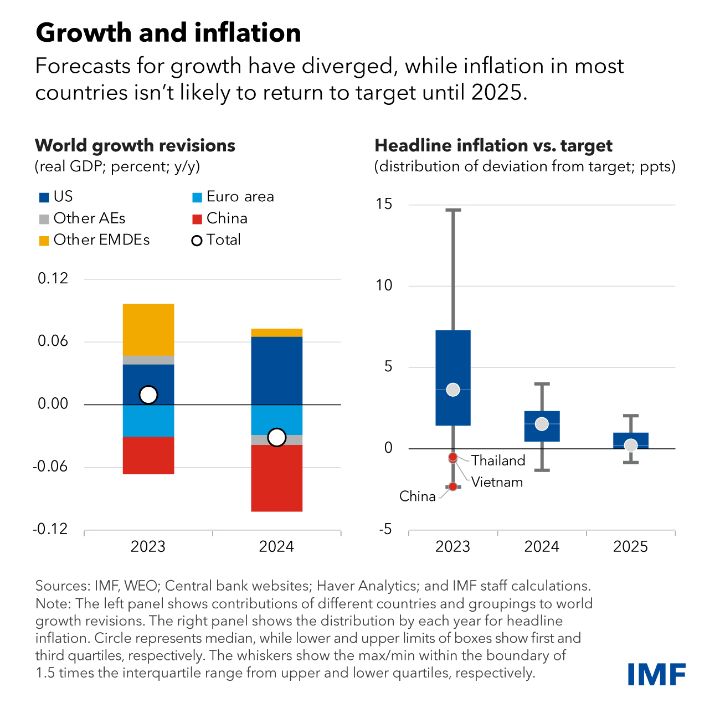Nairobi, Kenya: In the vibrant heart of Kenya, citizens are collectively questioning the economic consequences of policies set by international giants, the World Bank and the International Monetary Fund (IMF).
Kenyan voices are echoing across the nation, challenging strategies they believe disproportionately benefit the affluent while leaving the less fortunate to bear the brunt of economic shifts. Some local experts have even gone as far as dubbing the IMF and World Bank as “the grand deceit of our times.”
The Story Unveiled:
1. IMF-Inspired Loan Interest Fluctuations: Kenyan individuals who committed to loan agreements back in 2020 are grappling with the economic ripples of monthly loan interest variations.
These fluctuations are attributed to decisions made by the Central Bank, which in turn are influenced by the IMF.
2. The Economic Downturn: The reverberations of these policies have been profound, with a multitude of businesses struggling to keep their doors open and some being forced to shut down.
3. The Informal Renaissance: Responding to economic challenges, many individuals and small-scale entrepreneurs are opting to operate their businesses from home. In some cases, this is done discreetly to avoid complex regulatory obstacles.
4. Government Departments Under Scrutiny: There’s a growing sentiment that Kenyan government entities, particularly the Resource Mobilization Department [World Bank/IMF desk at the National Treasury] is functioning to undermine the interests of the National Treasury & Economic Planning (NT).
5. The Quest for African Economic Sovereignty: Amid these concerns, there’s a resounding question about the IMF’s ultimate objective in Africa—to heighten the burden of debt and perpetually shackle nations to economic subservience.
6. Leadership in the Crosshairs: Amid this whirlwind of economic debate, Kenyans are also challenging the role of leadership in safeguarding the nation’s interests.
Voices Resonating Globally:
– President William Ruto, Kenya: “I am happy that I am the president of Kenya when things are tough because when they are, it needs someone like me to lead. If it was someone else, Kenya would have already sunk.”
From the Global People’s Tribunal:
– The Global People’s Tribunal, an assembly of global experts in economics, human rights, and social justice, has unequivocally labeled the World Bank and IMF as “the grand deceit of our times.”
Unpacking the FAQs:
Q1: What’s causing unease among Kenyans about IMF and World Bank policies?
A1: The policies are perceived to favor the wealthy while inflicting economic hardship on the majority.
These fluctuations are attributable to monthly decisions by the Central Bank’s monthly Economic Policies on the Base Lending rates, which are influenced by the IMF.
Q2: Are there grounds for these concerns?
A2: The recent Global People’s Tribunal deemed these international institutions a “grand deceit” and accused them of robbing the poor to enrich the affluent.
Testimonies from numerous affected nations, including Kenya, were heard.
Q3: How are Kenyan lives affected by these policies?
A3: The policies have led to reduced public spending, privatization of crucial services, escalating living costs, and inadequately funded public services.
The burden disproportionately falls on women and marginalized groups, as debt repayments often take priority over people’s rights and needs.
Q4: What’s the economic outlook for Kenya amid these challenges?
A4: It remains a subject of fierce debate as Kenyans raise their voices, seeking economic autonomy and fairer policies.
Q5: How are Kenyan leaders responding to these concerns especially the National Leadership
Kenyans are challenging the role of the National leadership in securing and safeguarding the nation’s interests
A5. Leadership’s role is a pivotal part of the debate, with many questioning their effectiveness in safeguarding national interests.
Q6: Are there global events tied to these concerns?
A6: Indeed, the annual meetings of the World Bank and IMF have lately been under scrutiny, accentuating these issues.
A Path Forward:
As Kenyans grapple with the multifaceted impact of IMF and World Bank policies, they are not only asking questions but actively seeking solutions to secure a more equitable economic future.
This global dialogue transcends borders and nationalities, reflecting a collective concern about the impact of these international financial institutions on economic inequality.
IMF & World Bank’s skewed policies in Kenya seek to prioritize the payment of Pending Bills and national debt to protect their business interests at the expense of human rights, health, education, cost of living and social protection, contrary to their clarion call to end poverty and build a shared prosperity in Africa.


I found this article to be incredibly insightful. It’s disheartening to see how IMF and World Bank policies can have such a significant impact on everyday Kenyan lives. I hope this article raises awareness and leads to positive changes
Eye-opening article. IMF and World Bank policies need a closer look. Thanks for shedding light on this issue
I had no idea the impact of these policies was so far-reaching. We need change
I’m glad this article highlights the importance of questioning the status quo. It’s time for a shift in priorities.
The Global People’s Tribunal’s verdict is a wake-up call for all of us
The Global People’s Tribunal’s verdict should be a turning point. It’s time to rethink our economic strategies
The unity and determination in the face of these challenges are inspiring. Let’s keep the conversation going
As a Kenyan, I appreciate articles like this that shed light on issues affecting our nation. It’s time for action
The Global People’s Tribunal’s label of ‘the grand deceit of our times’ for the World Bank and IMF is a stark reminder of the importance of scrutinizing international policies. It’s high time our leaders put the interests of our nation and its people first
I’m truly impressed by the courage of Kenyan voices challenging these policies. Change starts with awareness
I’m impressed by the collective effort to seek solutions. Together, we can make a difference.
Kudos to the author for addressing this crucial issue. It’s time for change
The mention of the annual meetings of the World Bank and IMF being under scrutiny is a positive sign. It shows that more people are becoming aware of these issues and pushing for change
I appreciate the comprehensive overview of the issues at hand. The impact of these policies on marginalized groups is particularly concerning. We need to hold our leaders accountable for ensuring a fair and equitable economic future
The ‘grand deceit’ label is powerful. It’s time for accountability and fairness in economic policies
This article opened my eyes to the hidden consequences of international economic policies. We can’t afford to ignore this anymore
The impact of these policies on women and marginalized groups is a pressing concern. We must address this
Kenyans are resilient, and their voices deserve to be heard. Let’s amplify their message